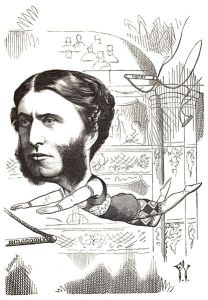The world of magic defies rational explanation, but beware dismissing it as nonsense. Like religious experience and poetry, it is a crucial aspect of being human, writes the Dark Materials author
via the Guardian by Philip Pullman

Illustration: Kai and Sunny
A new exhibition at the Ashmolean Museum in Oxford brings together a multitude of objects and artworks – there’s a “poppet” or rag doll with a stiletto stuck through its face, an amulet containing a human heart, a wisp of “ectoplasm” apparently extruded by a medium in Wales, and too many others to count – from a dark world of nonsense and superstition that we ought to have outgrown a long time ago. At least, that’s how I imagine rationality would view it. I find myself in an awkward position rationality-wise, because my name is listed on the website of the Rationalist Association as a supporter, and at the same time I think this exhibition is full of illuminating things, and the mental world it illustrates is an important – no, an essential part of the life we live. I’d better try to work out what I mean.
Continue reading
==============================
The 50 best horror novels of all time
via Boing Boing by Mark Frauenfelder

These kinds of best-of lists are always highly personal, but this list of great horror novels include several that I love, including World War Z, Rosemary’s Baby, and The Exorcist.
Continue reading
==============================
Reining in Alternative Gravity
via 3 Quarks Daily: Fabian Schmidt in APS Physics

Figure 1: Recent observations of a neutron star merger 130 million light years away found that gravitational waves and light from the event arrived at Earth within 2 s of one another.
Our current theory of gravity, general relativity (GR), has been spectacularly successful. It accurately describes the dynamics of astronomical objects over a vast range of sizes from planets and stars, to black holes, all the way to galaxies. GR also predicts the expansion of the Universe as a whole.
Continue reading
==============================
The godfather of Brit noir: cult crime writer Ted Lewis is due a renaissance
When he died in 1982, he was remembered in the literary world – if at all – solely as the man who “wrote that film with Michael Caine”.
via the New Statesman by Ben Myers

TED LEWIS ON SET OF GET CARTER (1971)
When he died in 1982 at the age of 42, the novelist Ted Lewis had achieved some success in “that London” but now lived with his mother in his north Lincolnshire home town of Barton-upon-Humber. He did the rounds of the town’s pubs each night, occasionally playing piano, then tramping home across muddy fields and ditches, or often deposited on the doorstep. He was remembered in the wider literary world – if he was remembered at all – solely as the man who “wrote that film with Michael Caine”, the Newcastle-set cinematic masterpiece Get Carter. Lewis’s novel was actually called Jack’s Return Home, and was set in Scunthorpe – his involvement in the film was minimal. Though Mike Hodges’s adaptation was entirely faithful to the wonderfully grubby tone of the text, a decade later its creator was reduced to a mere footnote in the film’s journey towards cult-dom.
Continue reading
==============================
Watch this timelapse of a guy single-handedly building a log cabin the woods
via Boing Boing by Rusty Blazenhoff
Well, this is damn impressive. Outdoorsman Shawn James built a log cabin in the Canadian woods all by himself -- without power tools – and created this timelapse video to prove it.
==============================
Britain by the Book: The Curious Story of the Third Printing Press in Britain
via Interesting Literature
In this week’s Dispatches from The Secret Library, we offer a brief excerpt from Dr Oliver Tearle’s new book, Britain by the Book: A Curious Tour of Our Literary Landscape
I’ve often thought that someone should write a book about interesting thirds. Firsts are interesting, of course, and the silver-medallists of history have their place, but the third of something is often fascinating in ways that can baffle and surprise.
Take Shakespeare’s First Folio, for instance – or rather, don’t take that, take his Third Folio instead. Copies of the Third Folio are worth more than a First Folio (which itself sells for a small fortune at auctions), because most of the Third Folios perished in the Great Fire of London. In the confessedly unlikely event that you should find an old Third Folio gathering dust in your attic, don’t throw it out thinking collectors are interested only in first editions.
Continue reading
==============================
Organisms as societies
a post by Johnathan Birth for the OUP blog

Dictyostelium discoideum 43 by Usman Bashir. CC-BY-SA-4.0 via Wikimedia Commons.
In the 19th century, biologists came to appreciate for the first time the fundamentality of the cell to all life on Earth. One of the early pioneers of cell biology, Rudolf Virchow, realized that the discovery of this cell brought with it a new way of seeing the organism. In an 1859 essay he described the organism as a ‘cell state’, or Zellenstaat, a ”society of cells, a tiny, well-ordered state, with all of the accessories—high officials and underlings, servants and masters, the great and the small.” In the 20th century, the ‘cell state’ metaphor fell out of favour in biology, but three recent trends in biology suggest it is due a revival.
Continue reading
==============================
Why picture books were once considered dangerous for children
via LibraryLink: Livia Gershon in JSTOR Daily

iStock
To anyone familiar with modern elementary schools, a classroom in colonial New England would look strange in many ways. Perhaps most obviously, the curriculum was almost exclusively religious. But in some respects, a bigger difference was the focus on teaching children in entirely abstract ways, without picture books or references to students’ real-world experiences.
Studying the commonly used New-England Primer, Stephanie Schnorbus explores a major change that took place as Calvinism gave way to Enlightenment ideas in the American classroom. This wasn’t secularization, she argues. But it was a shift in deeply held ideas about human nature.
Continue reading
==============================
Imagine All the Trees Are Gone — Maybe You Don't Want To
via the Big Think blog by Robby Berman
They’re everywhere. No wonder we take them for granted at times. Trees. Sure, we know they absorb CO2 and produce oxygen we need — that’s certainly a big deal. But recently, Alton Cedar Greenhouses, a UK company that designs and builds greenhouses framed in cedar, dug deeper into just how much we depend on them. They’ve created an infographic that lays it all out, showing how the benefits trees provide branch outward through our own ecosystem. It leaves us feeling even more protective of these vital, largely silent, lifeforms.
Continue reading
==============================
A Short Analysis of Matthew Arnold’s ‘Below the surface-stream’
via Interesting Literature
A reading of a little-known miniature poem

Matthew Arnold cartoon by Frederick Waddy, 1872; Wikimedia Commons
‘Below the surface-stream, shallow and light’: so begins a little gem of a poem which features in the complete poems of Victorian poet Matthew Arnold (1822-88). Arnold famously gave up poetry because he felt he had largely failed in his vocation, but as this five-line poem shows, he sometimes had a succinct way with words which many of his wordier contemporaries could never master.
Continue reading
No comments:
Post a Comment